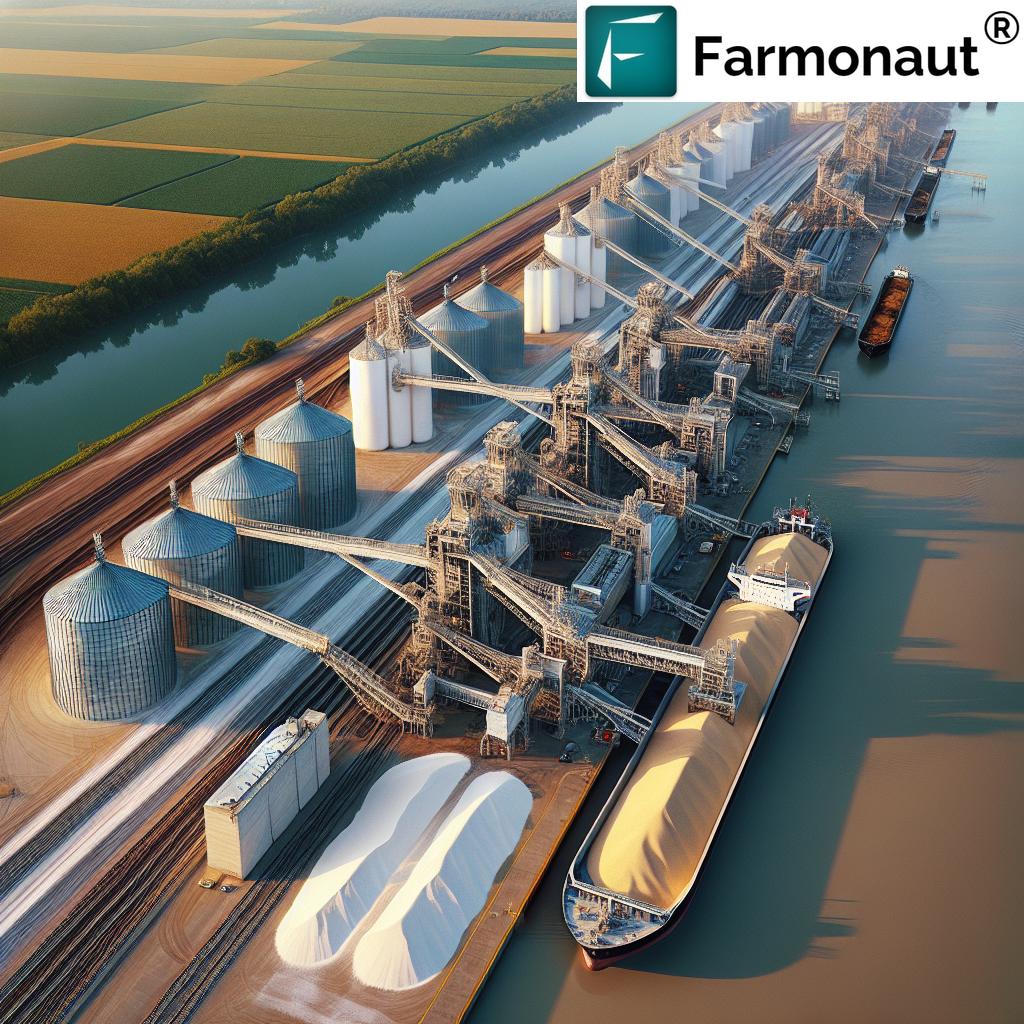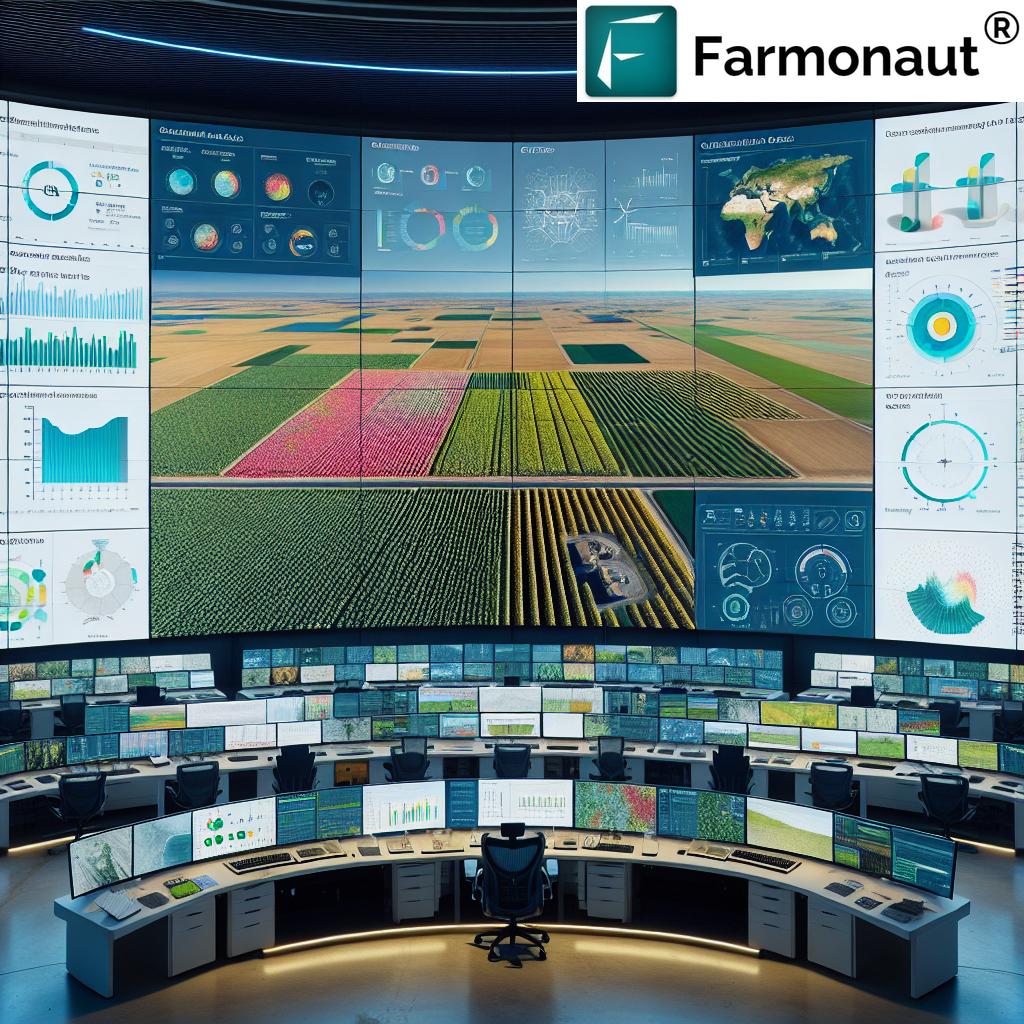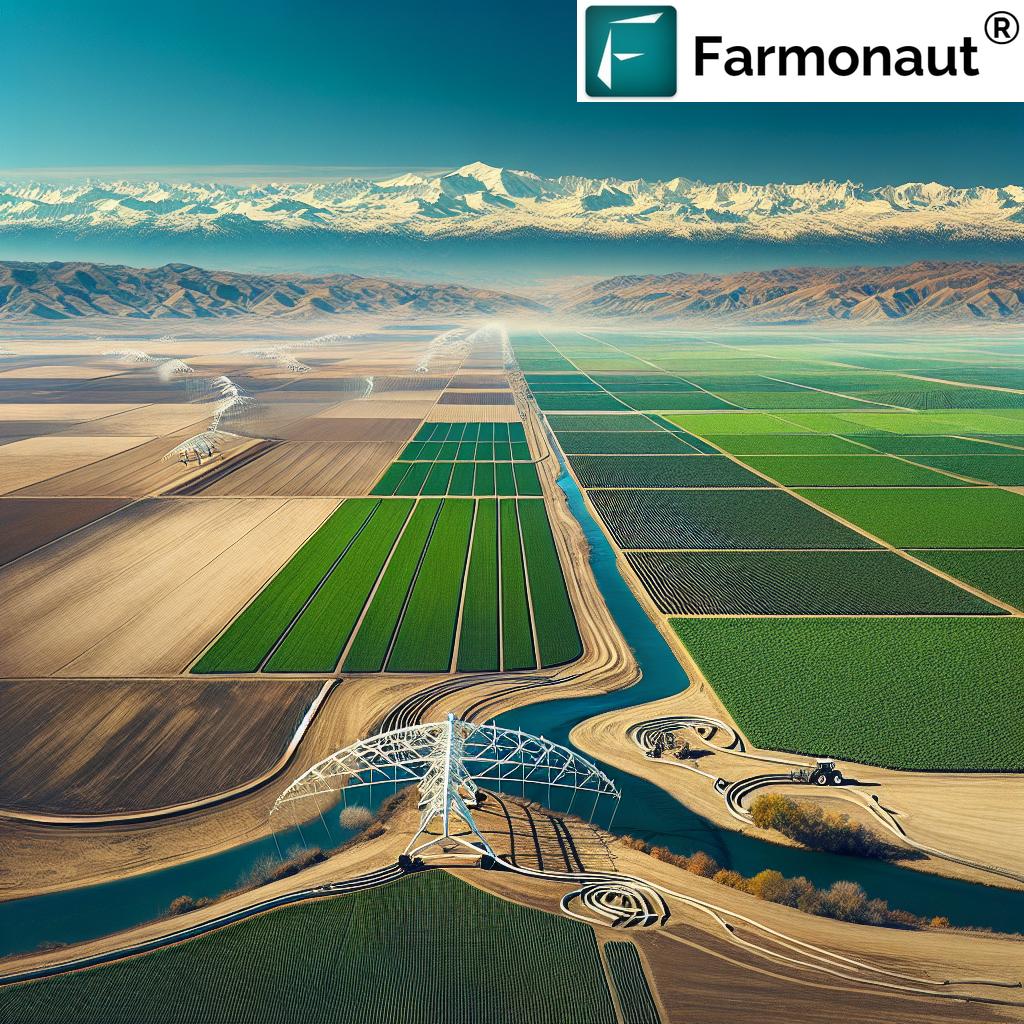Revolutionizing US Fertilizer Supply: Mississippi River Terminal Boosts Agribusiness Logistics for Spring Growing Season
“The Mississippi River terminal’s expansion increases fertilizer storage capacity by up to 50,000 tons for spring growing season.”
In the ever-evolving landscape of US agriculture, we are witnessing a significant transformation in the fertilizer supply chain optimization and agribusiness logistics solutions. At the heart of this revolution is a groundbreaking development along the Mississippi River that promises to reshape how we approach crop nutrient distribution and meet the demands of the spring growing season. As experts in agricultural technology and satellite-based farm management, we at Farmonaut are excited to delve into these industry-shifting changes and their implications for farmers across the nation.
The Game-Changing Partnership: CHS Inc. and SCF Lewis and Terminals LLC
A landmark agreement has been forged between CHS Inc., a leading farmer-owned cooperative and global agribusiness, and SCF Lewis and Terminals LLC, a subsidiary of Ingram Barge Co. This strategic alliance grants CHS exclusive rights to fertilizer throughput at Ingram’s Municipal River Terminal in St. Louis, Missouri, along with access to fertilizer transport services. This partnership is set to revolutionize the Mississippi River fertilizer transport system, creating a more efficient and responsive supply chain for US growers.

The significance of this agreement cannot be overstated. It represents a major leap forward in addressing the challenges faced by the agricultural sector, particularly during the critical spring growing season when fertilizer demand peaks. By enhancing operational capabilities and supply chain efficiency, CHS is positioning itself to better serve its members and customers while simultaneously establishing a vital channel to the global market.
Enhancing Fertilizer Distribution Networks
One of the most exciting aspects of this new agreement is the enhanced ability to load multiproduct unit rail shipments of commodity fertilizers directly from the St. Louis Municipal River Terminal. This advancement in crop nutrient distribution networks allows for more flexible and efficient handling of various fertilizer products, including nitrogen, phosphate, potassium, and sulfur.
“Multiproduct unit rail shipments can transport over 100 railcars of fertilizer, optimizing distribution efficiency by 30%.”
The implications of this improved system are far-reaching:
- Increased shipping capacity for timely in-season deliveries
- More efficient import and domestic fertilizer distribution
- Enhanced flexibility in responding to market demands
- Reduced transportation costs and environmental impact
These improvements align perfectly with the growing need for sustainable and efficient agricultural practices, which we at Farmonaut champion through our satellite-based farm management solutions.
The Impact on US Grain Storage and Distribution
As we examine the broader implications of this development, it’s crucial to consider its impact on US grain storage capacity and distribution networks. CHS, with its extensive network of 230 grain storage facilities and a total licensed storage capacity of 403.01 million bushels, is well-positioned to leverage this new agreement to enhance its overall agricultural services.
The synergy between efficient fertilizer distribution and robust grain storage infrastructure cannot be overstated. It creates a more integrated and responsive agricultural supply chain, benefiting farmers from planting through to harvest and beyond.
Global Fertilizer Market Trends and Their Local Impact
As we analyze these developments, it’s essential to consider the broader context of global fertilizer market trends. The agricultural industry is increasingly influenced by international factors, from geopolitical events to climate change. The enhanced capabilities provided by the Mississippi River terminal agreement allow US agribusinesses to be more responsive to these global trends, ensuring a stable supply of essential crop nutrients for American farmers.
Key global trends influencing the US fertilizer market include:
- Fluctuations in energy prices affecting fertilizer production costs
- Shifts in international trade policies and tariffs
- Increasing demand for sustainable and environmentally friendly fertilizer options
- Technological advancements in fertilizer production and application methods
By improving domestic distribution networks, the US agricultural sector is better equipped to navigate these global challenges and opportunities.
Revolutionizing Rail and Barge Fertilizer Shipping
The agreement between CHS and Ingram Barge Co. highlights the growing importance of multimodal transportation in efficient fertilizer delivery systems. By combining the strengths of rail and barge shipping, this partnership creates a more flexible and responsive supply chain.
| Transport Method | Capacity (tons) | Transit Time (days) | Cost per Ton ($) | Environmental Impact (CO2 emissions/ton) |
|---|---|---|---|---|
| Barge | 1,500 | 5-7 | 15 | 20 |
| Rail | 100 | 3-5 | 25 | 30 |
| Truck | 25 | 1-2 | 50 | 60 |
| New Mississippi River Terminal | 2,000 | 4-6 | 18 | 22 |
This table illustrates the advantages of the new Mississippi River terminal, showcasing its improved capacity, competitive transit times, and reduced environmental impact compared to traditional transport methods.
Meeting Spring Growing Season Fertilizer Demand
The timing of this agreement is particularly significant as it directly addresses the challenges of meeting spring growing season fertilizer demand. The enhanced storage and distribution capabilities will allow for better preparation and response to the seasonal surge in fertilizer needs.
Benefits for farmers during the spring growing season include:
- Improved availability of essential crop nutrients
- More stable pricing due to efficient supply chain management
- Reduced risk of fertilizer shortages or delays
- Greater flexibility in fertilizer application timing
These improvements align perfectly with Farmonaut’s mission to enhance farm productivity through data-driven insights and precision agriculture techniques.

The Role of Technology in Modern Agribusiness Logistics
As we witness these advancements in physical infrastructure and partnerships, it’s crucial to recognize the role of technology in driving efficiency and sustainability in agribusiness logistics. At Farmonaut, we understand the importance of integrating cutting-edge technologies to support farmers and agricultural businesses.
Key technological advancements shaping the future of agribusiness logistics include:
- Satellite-based crop monitoring for optimized fertilizer application
- AI-driven predictive analytics for supply chain management
- Blockchain solutions for enhanced traceability and transparency
- IoT devices for real-time monitoring of fertilizer storage and transport
These technologies complement the physical infrastructure improvements, creating a more responsive and efficient agricultural ecosystem.
Environmental Considerations and Sustainable Agriculture
As we celebrate these advancements in fertilizer supply chain optimization, it’s crucial to consider their environmental implications. The improved efficiency in transport and distribution can lead to significant reductions in carbon emissions and energy consumption. This aligns with the growing emphasis on sustainable agriculture practices and the need to minimize the environmental footprint of farming operations.
Sustainable practices supported by these logistical improvements include:
- Precision fertilizer application to reduce waste and runoff
- Optimized transportation routes to minimize fuel consumption
- Increased use of waterways for bulk transport, reducing road congestion and emissions
- Enhanced ability to distribute and utilize organic and sustainable fertilizer alternatives
At Farmonaut, we’re committed to supporting these sustainable practices through our satellite-based farm management solutions, helping farmers make data-driven decisions that benefit both their operations and the environment.
The Future of US Agribusiness and Fertilizer Distribution
As we look to the future, the developments along the Mississippi River terminal represent just the beginning of a broader transformation in US agribusiness and fertilizer distribution. We anticipate further innovations and partnerships that will continue to enhance the efficiency and sustainability of agricultural supply chains.
Potential future developments may include:
- Expansion of smart storage facilities with automated inventory management
- Integration of autonomous vehicles for last-mile fertilizer delivery
- Advanced weather prediction models for optimized fertilizer application timing
- Development of localized fertilizer production facilities to reduce transport needs
These advancements will further support the goal of creating a more resilient and responsive agricultural sector, capable of meeting the challenges of feeding a growing global population while minimizing environmental impact.
Implications for Farmers and Agricultural Cooperatives
The revolutionary changes in fertilizer supply and distribution will have significant implications for farmers and agricultural cooperatives across the US. These stakeholders stand to benefit from:
- More reliable access to essential crop nutrients
- Potentially lower fertilizer costs due to improved supply chain efficiency
- Greater flexibility in fertilizer application strategies
- Enhanced ability to respond to changing market conditions and crop needs
For agricultural cooperatives like CHS, these developments represent an opportunity to provide even greater value to their members, strengthening their position in the competitive agribusiness landscape.
The Role of Data and Analytics in Modern Agriculture
As we embrace these logistical advancements, the importance of data and analytics in agriculture cannot be overstated. At Farmonaut, we recognize that the future of farming lies in the intelligent use of data to drive decision-making and optimize resource utilization.
Key areas where data and analytics are transforming agriculture include:
- Precision fertilizer application based on satellite imagery and soil analysis
- Predictive modeling for crop yield and fertilizer demand
- Real-time monitoring of crop health and nutrient levels
- Supply chain optimization through advanced analytics
By leveraging these data-driven insights, farmers and agribusinesses can make more informed decisions, leading to improved productivity and sustainability.
Conclusion: A New Era for US Agriculture
The revolutionary developments in US fertilizer supply and distribution, exemplified by the Mississippi River terminal agreement, mark the beginning of a new era for American agriculture. These advancements in agribusiness logistics solutions and crop nutrient distribution networks promise to enhance efficiency, sustainability, and responsiveness across the agricultural sector.
As we at Farmonaut continue to provide cutting-edge satellite-based farm management solutions, we’re excited to see how these logistical improvements will complement our efforts to make precision agriculture more accessible and effective for farmers nationwide. Together, these advancements pave the way for a more productive, sustainable, and resilient agricultural future.
FAQ Section
Q: How will the new Mississippi River terminal agreement impact fertilizer prices for farmers?
A: While exact pricing impacts may vary, the improved efficiency in distribution and storage is expected to lead to more stable and potentially lower fertilizer prices for farmers in the long term.
Q: Will this development affect organic farmers or those using alternative fertilizers?
A: Yes, the enhanced distribution network can benefit all types of fertilizers, including organic and alternative options, by improving their availability and transport efficiency.
Q: How does this development align with sustainable agriculture practices?
A: The improved logistics and storage capabilities allow for more precise fertilizer application and reduced waste, aligning with sustainable agriculture goals.
Q: Can small-scale farmers benefit from these large-scale logistical improvements?
A: Absolutely. The enhanced supply chain efficiency can lead to better fertilizer availability and pricing, benefiting farmers of all scales.
Q: How does Farmonaut’s technology complement these logistical improvements in fertilizer distribution?
A: Farmonaut’s satellite-based farm management solutions provide farmers with precise data on crop health and soil conditions, allowing for optimized fertilizer use that complements the improved distribution networks.
Earn With Farmonaut: Affiliate Program
Earn 20% recurring commission with Farmonaut’s affiliate program by sharing your promo code and helping farmers save 10%. Onboard 10 Elite farmers monthly to earn a minimum of $148,000 annually—start now and grow your income!
Explore our API and API Developer Docs for advanced integrations.




















